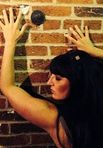Carpe noctem Book interview: Natalie Giarratano
 Sundress Publications, 2017 THINGS WE’RE DYING TO KNOW…
Sundress Publications, 2017 THINGS WE’RE DYING TO KNOW…Let’s start with the book’s title and your cover image. How did you choose each? And, if I asked you to describe or sum up your book, what three words immediately come to mind?
The book went through several titles—including “Low-Water Mark,” a poem that is no longer in the book—and ultimately it seemed that “Big Thicket Blues,” the longest poem, captures many of the themes and moods of the book and works as the overall title. One of my mentors, Bill Olsen, suggested the title (I’m glad that I listened).
As for the cover image, I was introduced to the artwork of Karina Hean through poet Mark Turcotte and felt that Hean’s “Untitled 12” captured movement and landscape and decay all at once. There’s something dangerous in it—like it wants to slink off of the page and infect the reader. In a good way.
Three words: violence, music, skin
What were you trying to achieve with your book? Tell us about the world you were trying to create, and who lives in it.
The world of the book is a microcosm of a small fraction of the shit that human beings do to each other. And I’m not only talking about large-scale violence, racism, and sexism but the micro-aggressions that are the norm for so many. I hope this book brings those things to (re)light and doesn’t allow the reader to look away. I hope these poems make the reader uncomfortable and question the ways in which they move through the world.
Can you describe your writing practice or process for this collection? Do you have a favorite revision strategy?
For this book, I was writing irregularly, as is often how I roll for better or worse, and most of the poems were written over a four-year period. I don’t like writing eventual aborted poems, so I usually have a solid idea of what I want to write about before getting anything down (this has so many drawbacks). I also revise after reading poems aloud (in public or otherwise)—it’s amazing what the inner ear can miss.
The book also went through several major overhauls, the most recent being the addition of the bracketed fragments that show up throughout the book (these used to be parts of a crown of sonnets I’d written about Leadbelly but decided they needed to be fragmented to work more dynamically).
How did you order the poems in the collection? Do you have a specific method for arranging your poems or is it sort of haphazard, like you lay the pages out on the floor and see what order you pick them back up in?
I feel as though all of the Texas-y poems needed to be up front, in the reader’s face. The middle tackles more sexism and honors some of the women writers who’ve influenced me. The final section moves into the body but also out of America, still staring down racism and persecution on a larger scale. I later added the bracketed poems/fragments in places at which I felt they best complemented the poems around them. So, while at some point, the poems were strewn across the floor, there have been so many revisions since that I can’t even remember every major movement.
Can you share an excerpt from your book? And tell us why you chose this poem for us to read – did it galvanize the writing of the rest of the collection? Is it your book’s heart? Is it the first or last poem you wrote for the book?
New Coyote
It’s midnight in New Mexico, after who knows
how many noddings-off, CD changes,
and quiet tamale stands in Texas dust,
before we feel safe enough: hundreds of miles
from Johnson Space Center and the I-45
corridor, where Houston investigators
routinely interview the bones of schoolgirls,
plenty far from looming rock formations
when out of the tumbleweed along I-10,
howls find their way out—coyotes siren
for hours. They appear along the sides
of the interstate only to disappear into dry dark.
The Chevy moves on quickly, its instinct
to flee. It’s the coyote’s to chase us down,
it’s mine to turn the car around—save us all,
as if they need saving, these neophilic creatures.
But maybe it is in my nature to go back,
to be amazed at its smallness, how voice can be
much bigger than body—like those of us
eight-year-olds who sang “We are the World” for seven
dead astronauts. They fell apart, their shuttle dissolved:
a cube of ice in the fevered mouth of the universe.
And I used to be able to fall asleep
by tree song, that familiar lull of rustle
and fidget in wind. Instead: chickens rip
open wide the air with squawks as coyotes
raid the neighbor’s coop and schoolboys
pied-piper their prize-winning swine
to slaughter. How does this all work?
Coyotes showing up in subways and
elevators. That day. These newspaper
clippings. This looking back on it as though
terror had forgone the spark of city for sky,
and all the days since I’ve tucked inside
skin and sleep, partly existing, never awake
to becoming some small, wild dog that haunts
a desert it doesn’t need any more.
originally published in Southern California Review
So, I wrote this poem pretty early on, back in 2008/2009, and I chose it for y’all because I think it captures some of the searching, some of the violence, some of the grief, some of the not knowing how to change anything that is woven throughout the book. And after I’d written about half of the book, I noticed that I was writing a lot of animals into my poems. I particularly appreciate the adaptability of the coyote, and this poem was initiated, if I remember correctly, by researching articles about coyotes actually showing up on a subway car, etc. I long to be more coyote-esque.
If you had to convince someone walking by you in the park to read your book right then and there, what would you say?
I might say, “Read this—what have you got to lose but time?”
I’ve heard poets say that they’re writing the same story over and over in their poems. Is that true for you?
I don’t know if “same story” applies, but I often write about Texas, which is where I’m from but haven’t lived for 12 years. Part of me is tired of going back to Texas in my poems. I don’t think fondly of many places in the state, so it’s pretty painful to keep returning. However, to say I will never return again is probably laughable.
Do you think poets have a responsibility as artists to respond to what’s happening in the world, and put that message out there? Does your work address social issues?
YES. We do not live or write in a vacuum. It seems more important than ever with this dangerous joke of a president/administration to be socially engaged. Words do matter. They often don’t seem as though they do, but sometimes they are everything, to the writer and hopefully to readers as needed.
The poems in Big Thicket Blues, on some level, address the normalization of racism and sexism and also how religion seems to too often play a role in that normalization.
Are there other types of writing (dictionaries, romance novels, comics, science textbooks, etc.) that help you to write poetry?
Everything I encounter helps me write poetry: snippets of conversation, comments on a YouTube video, researched info (i.e. Leadbelly, James Byrd, Jr., Virginia Woolf), music of all kinds, a well-written TV show or film. Essays, poetry, everything in between. The spark for the title poem in Big Thicket Blues came about while co-editing Jake Adam York’s “An Unfinished Sentence” for Pilot Light, so even my other kinds of work can lead to poetry.
What are you working on now?
I’m working on getting back into the habit of writing after not writing much since I became pregnant with my daughter. Weird poems about ISIS news coverage or angry bits about my scary post-partum experience. Sort of in limbo with a “next project” and dealing with my feelings about being a newish oldish mother and, more recently, about the not-so-funny ineptitude of the leader of the free world.
What book are you reading that we should also be reading?
CD Wright’s Shallcross
Without stopping to think, write a list of five poets whose work you would tattoo on your body, or at least write in permanent marker on your clothing, to take with you at all times.
Yusef Komunyakaa
CD Wright
Allen Ginsberg
Lynda Hull
Rachel Eliza Griffiths
***
Purchase Big Thicket Blues.

Originally from small-town Southeast Texas, Natalie Giarratano received her Ph.D. in creative writing from Western Michigan University. She is the author of Big Thicket Blues (Sundress Publications, January 2017) and Leaving Clean, winner of the 2013 Liam Rector First Book Prize in Poetry (Briery Creek Press, 2013). Her poems have appeared in Sakura Review, Beltway Poetry, Tupelo Quarterly, Tinderbox, and TYPO, among others. She edits and lives near the foothills of Northern Colorado with her partner, their daughter, and pup. Find her online at www.nataliegiarratano.com. Learn more about her editing services at http://editor.nataliegiarratano.com/.
Published on February 03, 2017 09:18
No comments have been added yet.



